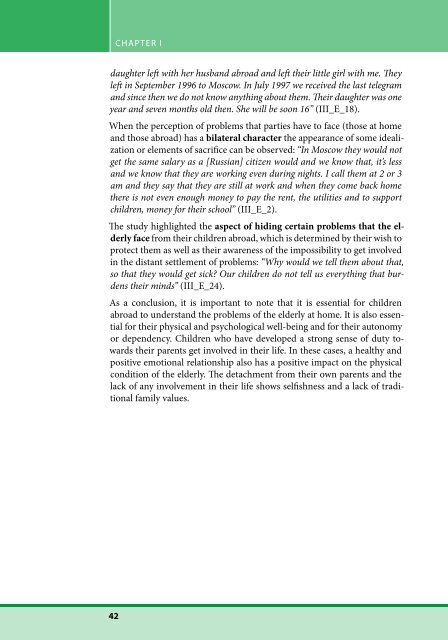specific needs of children and elderly left behind as a ... - IOM Moldova
specific needs of children and elderly left behind as a ... - IOM Moldova
specific needs of children and elderly left behind as a ... - IOM Moldova
Create successful ePaper yourself
Turn your PDF publications into a flip-book with our unique Google optimized e-Paper software.
CHAPTER I<br />
daughter <strong>left</strong> with her husb<strong>and</strong> abroad <strong>and</strong> <strong>left</strong> their little girl with me. They<br />
<strong>left</strong> in September 1996 to Moscow. In July 1997 we received the l<strong>as</strong>t telegram<br />
<strong>and</strong> since then we do not know anything about them. Their daughter w<strong>as</strong> one<br />
year <strong>and</strong> seven months old then. She will be soon 16” (III_E_18).<br />
When the perception <strong>of</strong> problems that parties have to face (those at home<br />
<strong>and</strong> those abroad) h<strong>as</strong> a bilateral character the appearance <strong>of</strong> some idealization<br />
or elements <strong>of</strong> sacrifice can be observed: “In Moscow they would not<br />
get the same salary <strong>as</strong> a [Russian] citizen would <strong>and</strong> we know that, it’s less<br />
<strong>and</strong> we know that they are working even during nights. I call them at 2 or 3<br />
am <strong>and</strong> they say that they are still at work <strong>and</strong> when they come back home<br />
there is not even enough money to pay the rent, the utilities <strong>and</strong> to support<br />
<strong>children</strong>, money for their school” (III_E_2).<br />
The study highlighted the <strong>as</strong>pect <strong>of</strong> hiding certain problems that the <strong>elderly</strong><br />
face from their <strong>children</strong> abroad, which is determined by their wish to<br />
protect them <strong>as</strong> well <strong>as</strong> their awareness <strong>of</strong> the impossibility to get involved<br />
in the distant settlement <strong>of</strong> problems: “Why would we tell them about that,<br />
so that they would get sick? Our <strong>children</strong> do not tell us everything that burdens<br />
their minds” (III_E_24).<br />
As a conclusion, it is important to note that it is essential for <strong>children</strong><br />
abroad to underst<strong>and</strong> the problems <strong>of</strong> the <strong>elderly</strong> at home. It is also essential<br />
for their physical <strong>and</strong> psychological well-being <strong>and</strong> for their autonomy<br />
or dependency. Children who have developed a strong sense <strong>of</strong> duty towards<br />
their parents get involved in their life. In these c<strong>as</strong>es, a healthy <strong>and</strong><br />
positive emotional relationship also h<strong>as</strong> a positive impact on the physical<br />
condition <strong>of</strong> the <strong>elderly</strong>. The detachment from their own parents <strong>and</strong> the<br />
lack <strong>of</strong> any involvement in their life shows selfishness <strong>and</strong> a lack <strong>of</strong> traditional<br />
family values.<br />
42

















